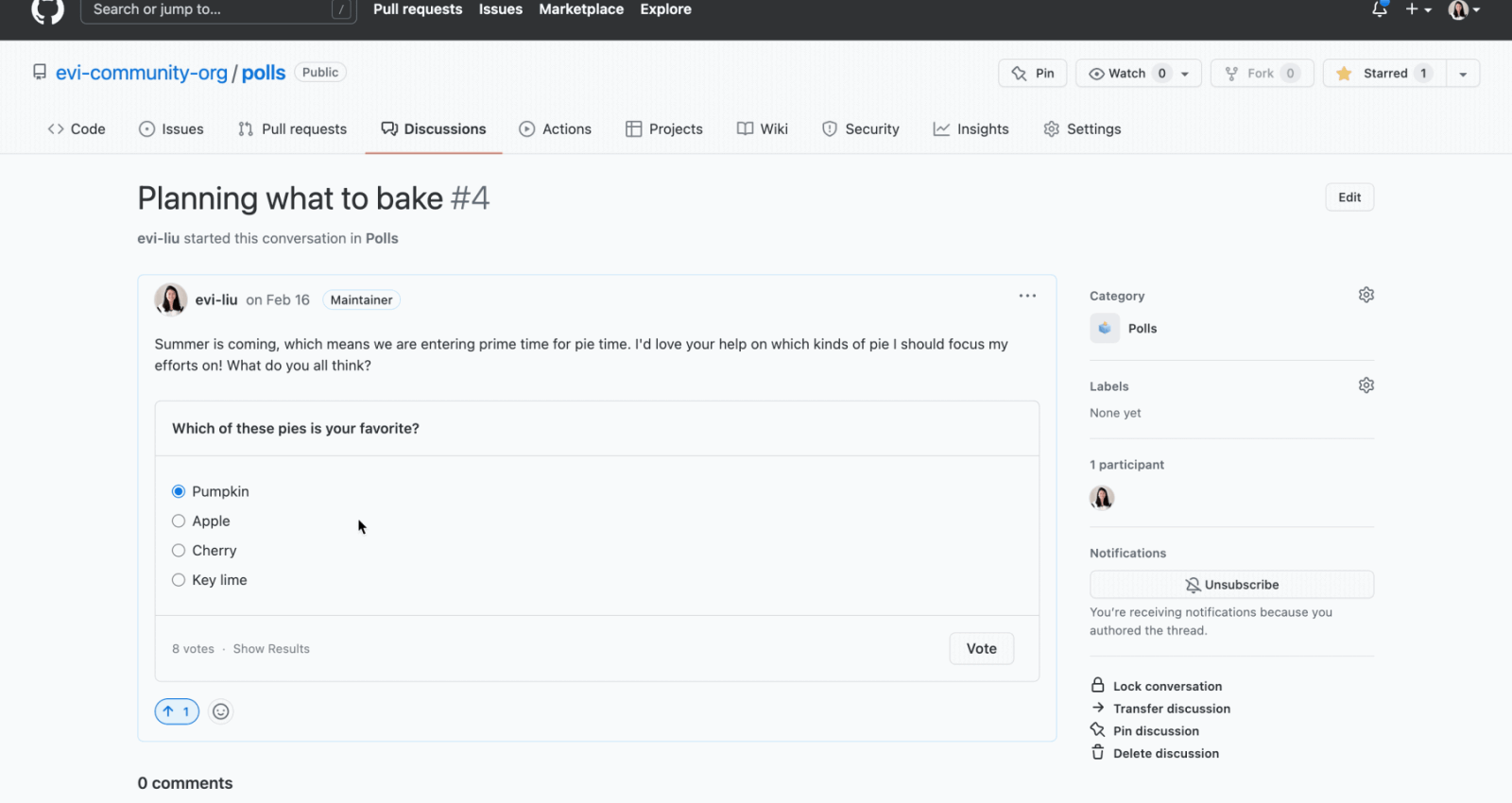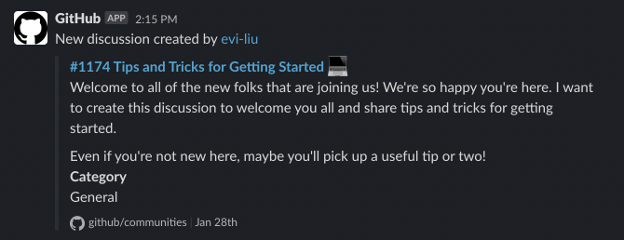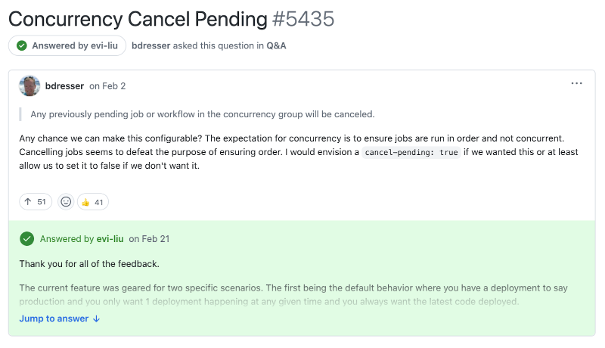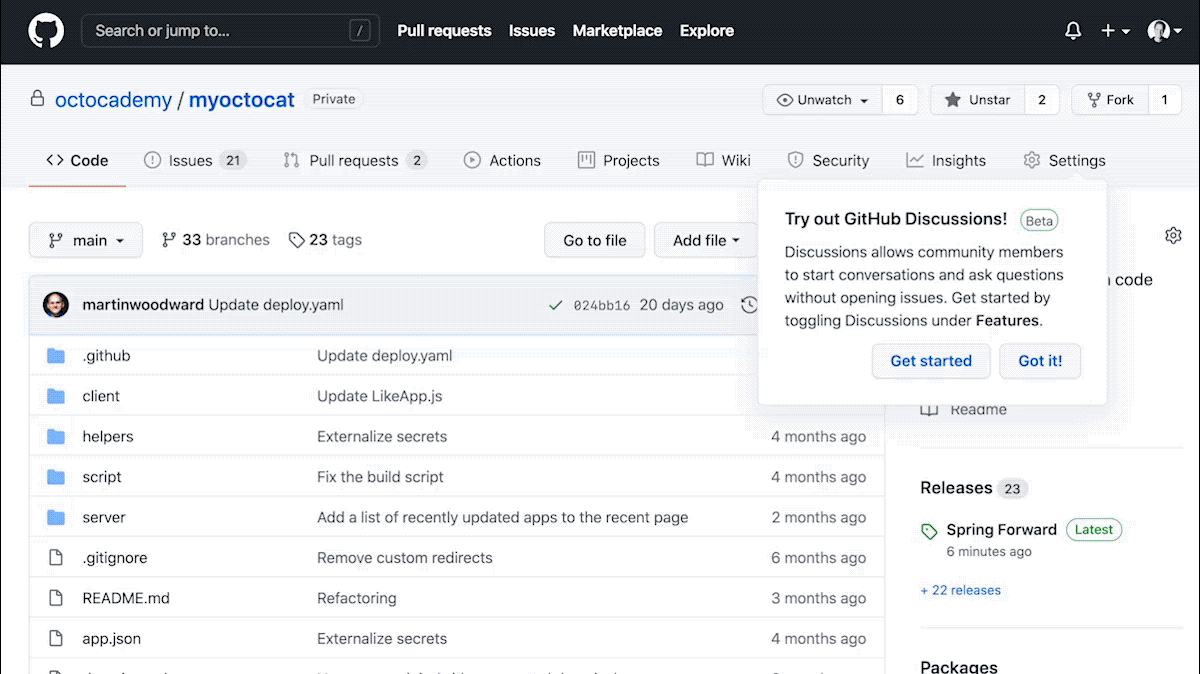What’s new in GitHub Discussions: Organization Discussions, polls, and more
Today, we’re excited to bring you a few new features that will help you communicate, collaborate, and connect seamlessly with teams and communities about the software you’re building with the help of GitHub Discussions.

Whether you’re working in open source or building something at work, creating software today takes so much more than just code. You need to manage ideas from team members, talk about roadmap items, discuss feature requests, and have a record of your decisions.
All of that typically involves going from your repository to a chat app, an email, a forum, or a … well, you get the idea.
We introduced GitHub Discussions to cut down on the amount of context switching and help make development workflows on GitHub more interconnected. Our goal has been to give developers and communities a centralized place to have conversations, ask questions, document decisions, and connect directly from their repositories.
Today, we’re excited to bring you a few new features that will help you communicate, collaborate, and connect seamlessly with teams and communities about the software you’re building with the help of GitHub Discussions.
Introducing Organization Discussions 🗣
When we first launched GitHub Discussions, we made an intentional decision to scope discussions to individual repositories. We wanted to make sure community conversations lived next to a team or community’s code—and their issues, too.
While this structure works well and continues to be sufficient for many projects, it became a blocker for organizations and communities with multiple repositories that wanted to adopt GitHub Discussions.
GitHub Discussions will now be supported at the organization level—for open source projects, enterprises, and development teams alike. Organization Discussions make it easier to centralize communications across projects and get a pulse on what’s happening across your community, teams, and company.
You can already see organization-level discussions in action in the Homebrew community, which uses it to consolidate its community questions, answers, and discussions across more than 20 repositories in one all-up view.
How to start using Organization Discussions: You can turn on GitHub Discussions at the organization level by going into your organization settings and enabling Discussions. You then configure which repository will be used to host discussions for the entire organization. The visibility of that repository will be used to control the visibility of organization-level discussions. Therefore, if you use a public repository, then everyone will be able to see them. Likewise, if you use a private or internal repository, only people in your organization will be able to take part.

A GIF showing how to enable Organization Discussions on GitHub
By popular request: polls are here 📊
Gauging community feedback and interest is a critical step in software development, and one of the most engaging and efficient ways to do so is by using polls. People also seem to really like polls, which has been one of the most highly-requested features we saw for GitHub Discussions to date.
We’re also happy to announce that the votes are in, and polls are now available to anyone using GitHub Discussions. Now, when you create a new discussion, you can select the Polls category to create a poll.

A GIF showing how to use polls with GitHub Discussions
You can add up to eight polling options for your community or teams to respond against. Anyone can see your poll if it’s on a public repository, but only logged-in users can vote for an option.
We’ve already seen a number of interesting use cases internally at GitHub for polls ranging from fun questions to design choices and roadmap planning help. Some of our engineering teams have even used polls to ask questions about their favored learning resources and how often one-on-one meetings should happen.
How to start using polls: You can either participate in active polls in your favorite open source communities, or start one yourself on any GitHub Discussions forum. Just start a new discussion, and then select Poll from the drop-down category menu in the top left.
Integrate Discussions with Slack and Microsoft Teams 📱
As developers, we know the value of communicating across a variety of platforms. And while GitHub Discussions offers a place to host and archive asynchronous conversations, chat applications are a critical part of how people and teams communicate and work every day.
That’s a big reason why we introduced integrations in GitHub Discussions with Slack and Microsoft Teams. Once you configure the application and subscribe to Discussions, you’ll get a notification every time a Discussions is created or answered.
How to use this feature: Check out our documentation about how to connect GitHub with Slack and Microsoft Teams. Once you connect GitHub to Slack or Teams, you can subscribe to Discussions in a channel via the following command:
/github subscribe <organization>/<repository> discussions

A screenshot of an automated Slack notification showing a newly-created GitHub Discussions thread with a preview of its content
A faster way to surface answers in Discussions 🔍
From its initial launch, Discussions has always had Q&A to give people a quick way to ask team members, other community members, and maintainers questions. From the Vercel community asking about preview deployments to the Dogecoin community talking through the nuances of Doge transaction fees, Q&A has been a core component of Discussions.
To make it easier to find, we now give a preview of the response the original poster marked as an answer at the top of the thread with a link that will take you to the full answer for more details.

A screenshot of an answer preview in GitHub Discussions
Start using GitHub Discussions today
Discussions is available on GitHub Free, GitHub Team, and GitHub Enterprise accounts for public and private repositories. Try turning it on in your repository or organization today by going to your settings and enabling Discussions.

A GIF showing how to enable GitHub Discussions in a repository.
Additional resources
- [Resources] What is GitHub Discussions? A complete guide
- [Blog] How five open source communities are using GitHub Discussions
- [Blog] 7 unique software collaboration features in GitHub Discussions
Tags:
Written by
Related posts

From pair to peer programmer: Our vision for agentic workflows in GitHub Copilot
AI agents in GitHub Copilot don’t just assist developers but actively solve problems through multi-step reasoning and execution. Here’s what that means.

GitHub Availability Report: May 2025
In May, we experienced three incidents that resulted in degraded performance across GitHub services.

GitHub Universe 2025: Here’s what’s in store at this year’s developer wonderland
Sharpen your skills, test out new tools, and connect with people who build like you.